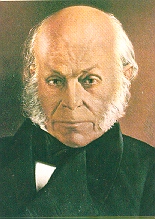 (John Quincy Adams)
(John Quincy Adams)
John Quincy Adams was the Sixth U.S. President and the first son of John Adams who was a signer of the 1776 Declaration of Independence and the Second U.S. President. Last month I read David McCullough’s biography of John Adams. http://www.electriceggplant.com/davidmccullough/adams.htm You may find this 656 page biography worthwhile reading not simply because it connects John Adams letters to his wife Abigail Adams with the events of the American Revolution, but most of all because it reveals the heart of Abigail Adams—a brilliant writer and woman uncorrupted by feminism. If you want a model woman for your studies of what women should aspire to be—I am supremely confident that you will find Abigail is your model.
Without Abigail there would never have been a John or a John Quincy Adams. At the same time, she had strong opinions that women should someday be afforded greater respect and elevated legal rights which she forcefully advanced in letters to her husband John. I believe that women have always had such feelings and have expressed them to their husbands. Yet, in ever instance, she subordinated her wishes to the demands of her husband and her family.
John Adams returned to Braintree, Massachusetts during the American Revolution and when he returned to Europe, he took young John Quincy with him. “Much of [John Quincy's] youth was spent overseas accompanying his father, who served as an American envoy to France from 1778 until 1779 and to the Netherlands in 1780. During this period, he acquired his early education at institutions such as the University of Leiden. After returning to America, he entered Harvard College and graduated in 1787. He was then admitted to the bar and began practicing law in Boston, Massachusetts.” http://en.wikipedia.org/wiki/John_Quincy_Adams
While there are historical accounts that John Adams was a Mason, David McCullough’s biography of John Adams states expressly that he was not a Mason. There is a possibility that both accounts are true in that John Adams was a member of the American Free & Accepted Masons while Benjamin Franklin was the founder of the American Free & Accepted Masons and a member of the Grand Orient of Freemasonry in Paris which John Adams never joined. I venture that John Quincy Adams was never any sort of Mason based upon his later writings, Letters on the Masonic Institution, which may have been part of a book on the same subject.
I am going to try to find this book and here is an example of why, “Thus it happened that Freemasonry, by cowering under the storm [the Captain William Morgan murder and resulting brouhaha http://freemasonrywatch.org/party.html], saved itself from the utter prostration which would have followed perseverance in the policy of resistance. Years have passed away, and it again gives symptoms of revivification. A new and kindred Institution has suddenly manifested an extraordinary degree of development under the guise of benevolence. What the precise nature of the obligations may be, which bind great numbers of citizens, mostly young, active men, into this connection, has not yet been fully brought to light. The: objects are stated to be charity and the rendering of mutual aid. If these are all the purposes of the association, it cannot be otherwise than meritorious. Yet it can scarcely be maintained that any unlimited pledge of secrecy is essential to the successful execution of them. In a republican forte of government, the only real and proper fraternity is the system of civil society. To that, every member is bound to bow. The obligations which it imposes need no veil of secrecy to cover them. Illustrated by the law of love enjoined by the superior authority of the divine command, it marks out with distinctness to each individual the paramount duty of charity, of benevolence and of mutual aid and support. There can be, therefore, no good excuse for resorting to smaller and narrower spheres for the invidious exercise of such virtues among those who ought to stand upon a perfectly even footing, when the broad and general one better answers to every useful and honorable exertion. The disadvantages attending the formation of all associations connected by secret obligations, no matter how harmless may be their appearance, are, first, that if they have any effect at all, it is injurious to those who do not choose to join them; secondly, that they substitute a private pledge of a doubtful nature to a few who have no moral right to the preference, for a clear and well defined and entirely proper one given to the many. In all similar cases, the tendency to introduce objects of exertion in the smaller circle which conflict with those of society at large, and which may sometimes even threaten its safety, is obvious.” http://users.crocker.com/~acacia/text_lmi.html 1847.
Here is an example of what John Quincy Adams was trying to say. http://www.tsrhc.org/index.cfm Henry--Don’t you think that this is an ingenious cover for a dope-dealing fertility cult dedicated to Satan? I speculate that after the loses of the American Revolution, the War of 1812, but its 1815 victory over the Grand Orient of Freemasonry’s champion, Napoleon, at Waterloo http://en.wikipedia.org/wiki/Battle_of_Waterloo that British Freemasonry reinvented itself in America “under the guise of benevolence” thus was born The Scottish Rite of Freemasonry which led the South into the U.S. Civil War. http://www.mail-archive.com/ctrl@listserv.aol.com/msg11479.html
 (John Quincy Adams)
(John Quincy Adams)





